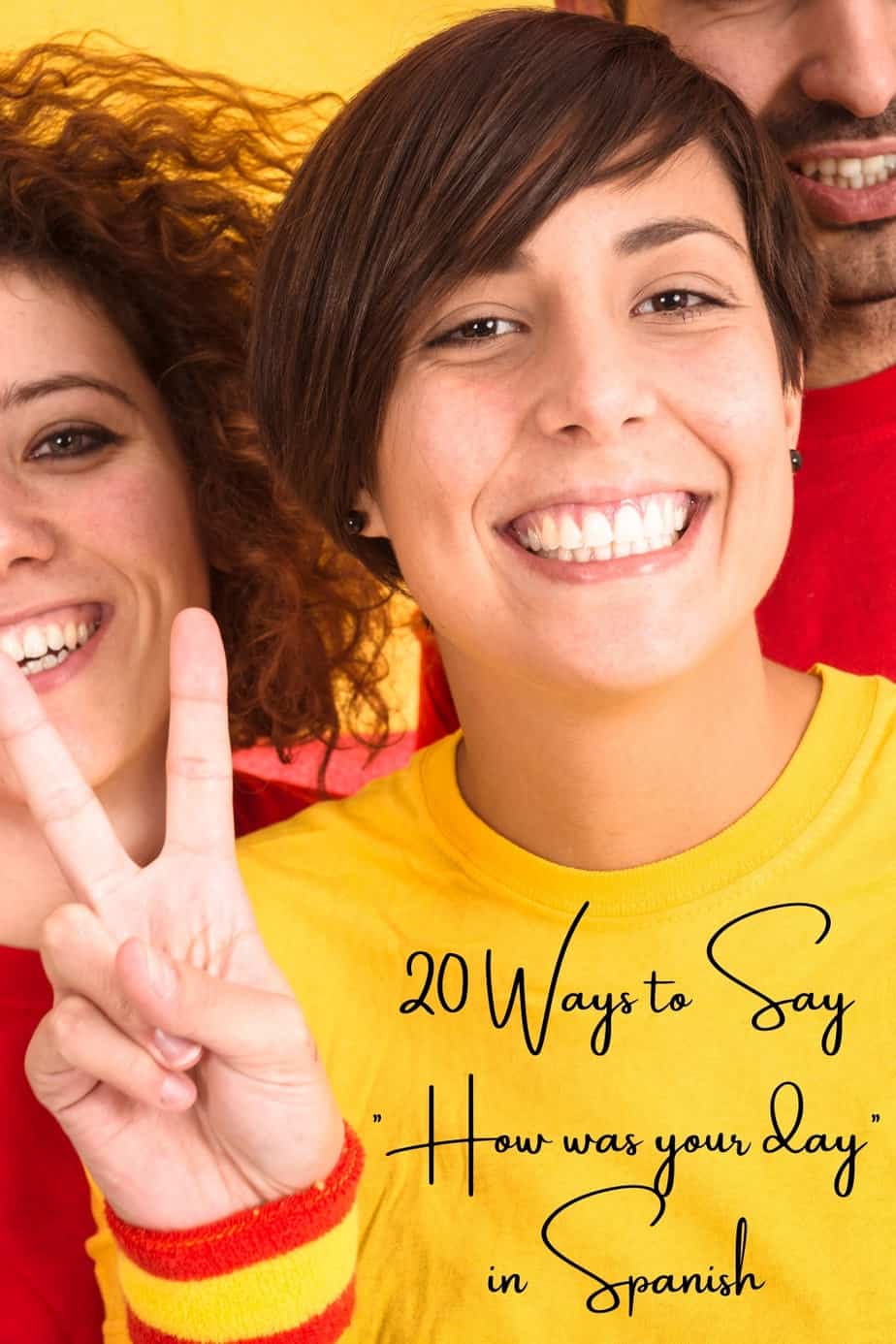The phrase ‘How was your day?’ is fantastically versatile. You can use it with acquaintances as an ice breaker, with friends to express an interest and with romantic partners to show you care.
So, if you want to know how to check in with your Spanish speaking friends, without repeating the same sentences over and over, keep reading.
In this post, we are going to learn twenty different ways to ask someone how their day is going.
How to say ‘How’s your day?’ in Spanish
- ¿Cómo estuvo tu día?
- ¿Cómo estuvo su día?
- ¿Cómo andas?
- ¿Qué me cuentas?
- ¿Qué tal tu día?
- ¿Qué tal el día?
- ¿Como te va?
- ¿Cómo te fue hoy?
- ¿Cómo le fue hoy?
- ¿Qué tal te va el día por ahora?
- ¿Cómo te ha ido el día hasta ahora?
- ¿Cómo estás hoy?
- ¿Cómo va todo hoy?
- ¿Comó fue la ultima semana?
- ¿Cómo te encuentras hoy?
- ¿Cómo has estado?
- ¿Cómo va todo?
- ¿Cómo van las cosas?
- ¿Qué pasa?’
- ¿Qué tal?
Let’s have a look at each one in closer detail.
1. ¿Cómo estuvo tu día?
When talking to someone informally (someone you know well, or is the same age and social standing as you) ¿cómo estuvo tu día? Is the most common way to ask someone how their day is going.
The verb estuvo is the preterit version of the verb ‘estar’ in the third person singular.
So it literally means ‘was.’ In this case, the Spanish sentence structure mirrors the English structure exactly:
¿Cómo = how
estuvo = was
tu = your
día? = day?
Example:
Maria : Santiago, ¿Cómo estuvo tu día?
Santiago : Estuvo muy bien !
Maria: Santiago, how was your day?
Santiago: It was great !
2. ¿Cómo estuvo su día?
¿Cómo estuvo su día? is exactly the same construction as ¿Cómo estuvo tu día? but it uses the formal ‘su’ rather than the informal ‘tu’ to mean ‘you.’
This means that we use it in formal contexts, when talking to elders and people of higher social standing. If you attend in-person Spanish classes, this would be the best way to ask your teacher how his/her day is going.
Example:
Maria : Senor Martinez, ¿Cómo estuvo su día?
Snr Martinez: ¡chitón!
Maria : Mr Martinez, how was your day?
Mr Martinez: Shhh!
3. ¿Cómo andas?
Andar is a regular -ar verb which means ‘to go’, so it’s the same as ‘how’s it going?’ in English.
Just like ‘how’s it going?’ it comes across as quite informal, so it’s probably not one to use with your Spanish teacher!
Because andar is a verb, we need to conjugate it if we’re using pronouns other than tu.
Usted – ¿Cómo anda?
Ustedes – ¿Cómo andan?
Vostros – ¿Cómo andáis?
Example:
Luis : Dora, ¿Cómo andas?
Dora : Bien
Luis : Dora, how’s it going?
Dora : Good
4. ¿Qué me cuentas?
Probably the most informal phrase on our list, ¿Qué me cuentas? Means ‘What are you telling me?’ and is equivalent to the English ‘What’s up?’
Because of the informality, you don’t give a literal answer to this one. You’re better off replying with ‘lo normal’ (the usual) or ‘nada’ (nothing).
Example:
Marco : Miguel, ¿Qué me cuentas?
Miguel : Nada.
Marco : Miguel, what’s up?
Miguel : Nothing.
5. ¿Qué tal tu día?
As we saw above ¿qué tal? means ‘how are you?’ So we can add ‘tu día’ to the end of the phrase to create ¿qué tal tu día?
This is rather an informal phrase, so again you’d use it more with one person you know very well.
Example:
Jorge : Miguel, ¿Qué tal tu día?
Miguel : Muy bien, gracias.
Jorge : Miguel, how’s your day?
Miguel : Great, thank you.
6. ¿Qué tal el día?
A variation on ¿Qué tal tu día ? above, but we are replacing ‘tu’ (your) with ‘el’ (the). So it seems a little bit less specific.
Example:
Jorge : Miguel, ¿Qué tal el día?
Miguel : Bien, gracias.
Jorge : Miguel, how’s the day going?
Miguel : It’s going well, thank you .
7. ¿Como te va?
¿Como te va? Is variant of ¿Qué tal? and should also be used in an informal setting.
Because we’re using the informal ‘te’ here, we need to use it in informal contexts. You can replace ‘te’ with ‘le’ if you want to be more polite.
Example:
Martina : ¿Como te va?
Raul : Mi esposa me dejó!
Martina : How’s your day going?
Raul : My wife left me!
8. ¿Cómo te fue hoy?
It might be that your friend has just sat an exam. Or perhaps they started a new job. Or when out on a date.
In that case, you might want to specify that you want to know how today has gone, rather than a generic ‘the day.’
In this case, we’re going to use the adverb ‘hoy’ (today) to make your phrase more specific. ¿Cómo te fue hoy? – How did it go today?
Example:
Martina : ¿Cómo te fue hoy?
Laura : Tuve un buen dia.
Martina : How did it go today?
Laura : My day was good.
9. ¿Cómo le fue hoy?
Perhaps you’re the boss of the new employee and you want to find out how the day went. In which case (to ensure you’re being polite) you’re going to use ‘le’ rather than ‘te’.
For more information on using ‘le’ you can check out our article When To Use ‘Le’ In Spanish – Grammar Guide.
If you’d like to learn more about politeness in Spanish culture, the Cultural Atlas team have written an informative guide Spanish Culture – Basic Etiquette.
Example:
Trini : Señor, ¿Cómo le fue hoy?
Sr Gomez : Puel, bien.
Trini : Sir, how did it go today?
Mr Gomez: Actually, it went well.
10. and 11. ¿Qué tal te va el día por ahora? and ¿Cómo te ha ido el día hasta ahora?
If, at lunchtime, you sit down with your new colleague and want to get the lowdown on how their morning has been, you can ask ‘¿Qué tal te va el día por ahora?’ or ‘¿Cómo te ha ido el día hasta ahora?’.
Both mean ‘how is your day going?’ or ‘how has your day been so far?’ with the implication that there is still more of the day to go.
Example:
Raul : Cómo te ha ido el día hasta ahora?
Pepito : ¡Mi examen fue fácil!
Raul : How’s your day been so far?
Pepito : My exam was easy!
12. and 13. ¿Cómo estás hoy? and ¿Cómo va todo hoy?
Or perhaps your lunch date is a friend, and you want to be a bit more informal when asking how their day has been so far.
In this case, rather than asking ‘¿Qué tal te va el día por ahora?’ or ‘¿Cómo te ha ido el día hasta ahora?’ you can use ‘¿Cómo estás hoy?’ and ‘¿Cómo va todo hoy?’
Example:
Miguel : Luis, ¿Cómo estás hoy?
Luis : Mi dia estuvo bien.
Miguel : Luis, how’s your day going?
Luis : My day went well
14. ¿Cómo fue la última semana?
If you haven’t seen someone in a few days, you can ask ‘¿Comó fue la ultima semana?’ which means ‘how was your week?’ This is a good phrase to use if a colleague has been on holiday and you want to check in with them, or if you’ve been away and want to see how someone is.
Example:
Laura : Ah, Miguel, ¿Cómo fue la última semana?
Miguel : Barcelona es muy bonita.
Laura : Ah, Miguel, how was your week?
Miguel : Barcelona is very pretty.
15. ¿Cómo te encuentras hoy?
However, if the reason you haven’t seen someone for a week or two is because they’ve been sick, you might want to ask ‘¿Cómo te encuentras hoy?’
The verb ‘encontrar’ means ‘to find’ so you’re literally asking someone ‘how do you find yourself today?’ but it is understood as implying that someone has been ill and you want to check on their current status.
Example:
Miguel : Y tu, ¿Cómo te encuentras hoy?
Laura : No me siento bien.
Miguel : And you? How are you keeping?
Laura : I don’t feel well.
16. ¿Cómo has estado?
Perhaps it hasn’t quite been a week. Maybe you did a city break in Lima for four days. Or maybe it was slightly longer than a week since you were last at work.
In which case, you can use ¿Cómo has estado? This phrase is generally heard in South American Spanish.
If it helps you remember, ‘estado’ means ‘state’ (as in ‘Estados Unidos’ which means ‘United States’) so think of asking what state someone is in, because it’s been a while since you’ve seen them.
Example:
Laura : Miguel, ¿Comó has estado?
Miguel : Muy bien.
Laura : Miguel, how have you been?
Miguel : Great.
17. ¿Cómo va todo?
If you’re interested in more than just someone’s day and want to know how their whole life is going, you can ask ‘¿cómo va todo?’ which means ‘how’s everything going?’ and is equivalent to the English ‘how are things?’
This is also an easy one to reply to because you can say ‘todo va’ with an appropriate adjective to sum up your day.
Example:
Isabella : Hola, Manuela. ¿Cómo va todo?
Manuela : Todo va fantastico !
Isabella : Hi Manuela. How are things?
Manuela : Everything’s fantastic!
18. ¿Cómo van las cosas?
‘Las cosas’ are ‘things’ and so ‘¿Cómo van las cosas?’ is a more literal ‘how are things?’
Just like in English, you can reply with a single adjective answer (bien, mal) or you can reply with a whole phrase.
Example:
Isabella : Hola, Manuela. ¿Cómo va todo?
Manuela : Las cosas van mal!
Isabella : Hi Manuela. How are things?
Manuela : Things are going poorly!
19. ¿Qué pasa?
This is used quite frequently by Spanish speakers in the USA when they code-switch (switch between speaking English and Spanish) and so can be heard in American English as well as Spanish.
It means ‘what’s happening’ and is just as colloquial as its English equivalent.
This is another phrase where short answers are appropriate, rather than a whole phrase.
Example:
Marco : Miguel, ¿Qué pasa?
Miguel : Lo normal.
Marco : Miguel, what’s happening?
Miguel : The usual.
20. ¿Qué tal?
¿Qué tal? is a very useful phrase meaning ‘how’s it going?’ or ‘how are you?’
It’s a great way to greet someone and is a nice way to show that you care.
Example:
Dora : Hola Luis, ¿Qué tal?
Luis : Regular.
Dora : Hi Luis, how’s your day going?
Luis : Fine.
Conclusion
So there we have it. Twenty different ways of asking about someone’s day in Spanish, in varying degrees of formality.
Using any of these phrases will help you quickly make friends (or acquaintances!) and will help you get to know the people around you better.
Be careful with the degree of formality you use, because it’s important to be polite, but don’t worry about using the wrong phrase. Your friends will be over-the-moon with any of the phrases you try!

Hey fellow Linguaholics! It’s me, Marcel. I am the proud owner of linguaholic.com. Languages have always been my passion and I have studied Linguistics, Computational Linguistics and Sinology at the University of Zurich. It is my utmost pleasure to share with all of you guys what I know about languages and linguistics in general.


